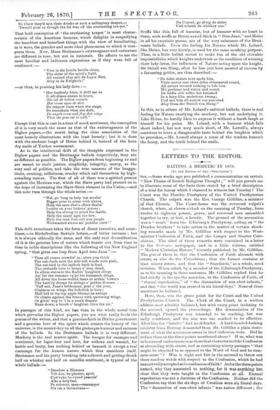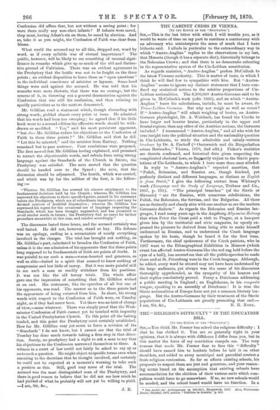LETTERS TO THE EDITOR.
BAITING A HERETIC IN 1870.
170 TIIE EDITOR OF THE "SPECTATOR."] SIR,—Some weeks ago you published a communication on certain "New Phases of Scotch Religious Thought ; " will you permit me to illustrate some of the facts there stated by a brief description of a trial for heresy which I chanced to witness last Tuesday? The Court was the Dundee Presbytery of the United Presbyterian Church. The culprit was the Rev. George Gilfillan, a minister of that Church. The Court-house was the reverend culprit's church, where, at eleven o'clock on the morning of Tuesday, from twelve to eighteen potent, grave, and reverend men assembled together to try, or bait, a heretic. The ground of the accusation was a " remit" from the Edinburgh Presbytery, calling on " the Dundee brothers" to take action in the matter of certain shock- ing remarks made by Mr. Gilfillan with respect to the West- minster Confession of Faith, and the Longer and Shorter Cate- chisms. The chief of these remarks were contained in a letter to the ,Scotsman newspaper, and in a little volume, entitled " Modern Christian Heroes," recently published by Mr. Gilfillan. The gist of them is, that the Confession of Faith abounds with errors, as also do the Catechisms ; that the former contains at least ninety errors, and that the " Standards," as a whole, need revision. When asked, by a member of the Edinburgh Presbytery, as to his meaning in these sentences, Mr. Gilfillan replied that he had chiefly in his eye the assertion, in the Confession of Faith, of "eternal reprobation," of "the damnation of non-elect infants," and that " the world was created in six literal days." None of these assertions he believed.
Here, then, was the grave point for the Court and the United Presbyterian Church. The Clerk of the Court, in a written address most adroitly balanced, but with every point inclining to the accused, opened the proceedings. His denunciation of the Edinburgh Presbytery was intended to be scathing, but was sadly overdone, and the aim was too marked to be effective. After him the "heretic" had no defender. A hard-headed-looking minister from Rattray demanded from Mr. Gilfillan a plain state- ment of what the numerous errors in the Confession were. Did he reduce them to the three points mentioned above? If so, what was to become of such sentences as those that characterized the Confession as abounding with errors, and as containing ninety passages " that might be objected to as opposed to the Word of God and to com- mon-sense "? Was it right and fair in the accused to throw out these random words with respect to the Confession, which he had unreservedly accepted as his confession of faith? As for the three points named, why they amounted to nothing, for it was anything but clear that they were taught in the Confession at all. Eternal reprobation was not a doctrine of the Confession. Neither did the Confession say that the six days of Creation were six literal days. The "damnation of non-elect infants" was rather different ; the
Confession did affirm that, but not without a saving point ; for were there really any non-elect infants? If infants were saved, they must, having Adam's sin on them, be saved by election. And so, take it as you might, the Confession of Faith was clear from blame.
What could the accused say to all this, dropped out, word by word, as if every syllable was of eternal importance ? The public, however, will be likely to see something of unusual signi- ficance in remarks which give up so much of the old and distinc- tive ground of Calvinism. There was an evident agreement in the Presbytery that the battle was not to be fought on the three points ; an evident disposition to leave these as " open questions " to the individual conscience of minister or layman. Some hard things were said against the accused. He was told that his remarks were mere rhetoric, that there was no courage, but the reverse of it, in throwing out a general denunciation against the Confession that was still his confession, and then refusing to specify particulars as to the matters denounced.
Mr. Gilfillan read a statement which, though abounding with strong words, yielded almost every point at issue. He admitted that his words had been too sweeping ; he agreed that if his little book went to a second edition the offensive words should be with- drawn or modified. " Yes," said his most persistent opponent, "but does Mr. Gilfillan reduce his objections to the Confession of Faith to these three points ?" Mr. Gilfillan said that he did. "Let this be minuted," said the minister from Rattray. Nothing remained but to pass sentence. Four resolutions were proposed, The first moved that Mr. Gilfillan having explained, and promised to retract the objectionable words, and refrain from using strong language against the Standards of the Church in future, the Presbytery was satisfied. The next moved that the question should be handed over to the Synod ; the next, that the discussion should be adjourned. The fourth, which was carried, and which was by far the mildest of the four, is the follow- ing :- "Whereas Mr. Gilfillan has avowed his sincere attachment to the fundamental doctrines held by the Church ; whereas Mr. Gilfillan has narrowed his objections to three specified points, named in his statement before the Presbytery, which are of subordinate importance, and may be deemed matters of doubtful disputation ; whereas Mr. Gilfillan has expressed his regret for the occasional use of language respecting the Standards which has been thought unguarded, and has promised to avoid similar words in future ; the Presbytery find no cause for farther procedure meanwhile in this case. and resolve accordingly."
The discussion lasted three hours, and the accused certainly was well baited. He did not, however, stand at bay. His defence was an apology, ending in a retractation of nearly everything involved in the charges. The trial has brought out nothing, on Mr. Gilfillau's part, calculated to broaden the Confession of Faith, unless it is the one admission of his opponents that the three points long supposed to be fundamentals of faith are points of doubt. It was painful to see such a man—warm-hearted and generous, as well as able—baited in a spirit that seemed to know nothing of compromise and but little of mercy. But it was more painful still to see such a man so readily withdraw from his positions. It was not like the old heresy trials. The whole affair gave one the impression of something that Mr. Gilfillan wished at an end. His statement, like the speeches of all but one of his opponents, was read. The answer as to the three points had the appearance of being extorted from him. In short, his strong words with respect to the Confession of Faith were, on Tuesday night, as if they had never been. Yet there was no hint of change of view,—none whatever. There was simply proof that the West- minster Confession of Faith cannot yet be touched with impunity in the United Presbyterian Church. To this point all the baiting tended, and this point the Presbytery most certainly established. How far Mr. Gilfillan may yet assist to force a revision of the "Standards" I do not know, but I cannot see that the trial of Tuesday has done much towards taking a firm step in that direc- tion. Surely, no presbytery had a right to ask a man to say that his objections to the Confession narrowed themselves to three. A witness in a court of law could not fairly be asked to say ay or no to such a question. He might object to specific terms even when assenting to the doctrines that he thought involved, and certainly he could not be expected at a moment's warning to take such a position as this. Still, good may come of the trial. The accused was the most distinguished man of the Presbytery, and
there is good reason to believe that he did not see how much he had yielded of what he probably will not yet be willing to yield. —I am, Sir, &c., J. R.



































 Previous page
Previous page